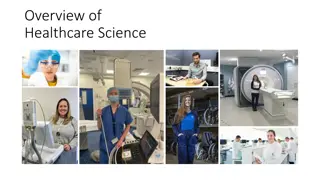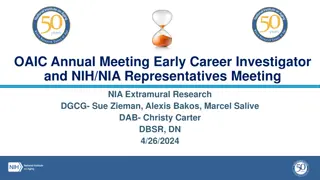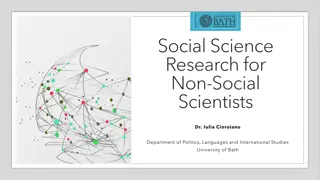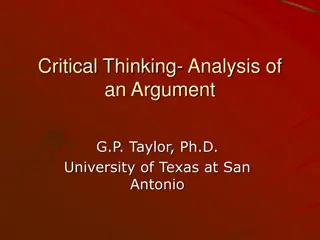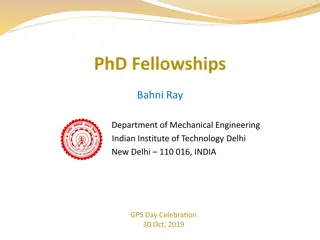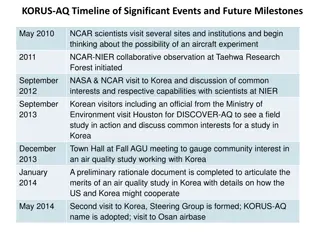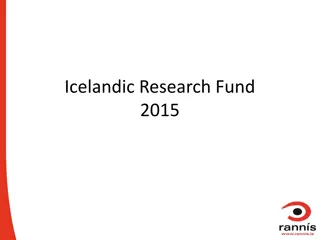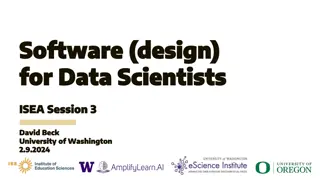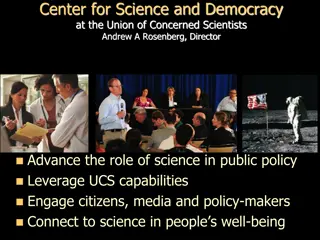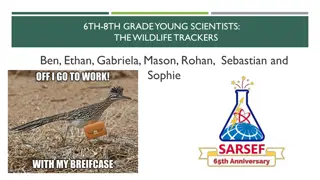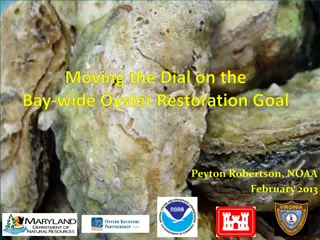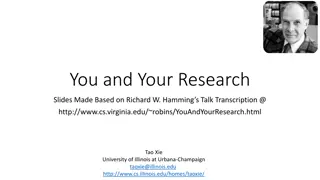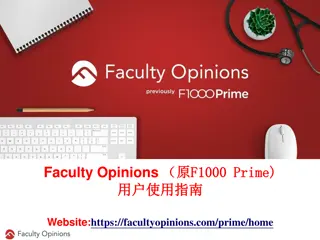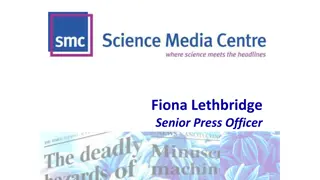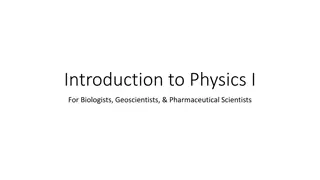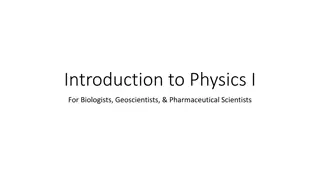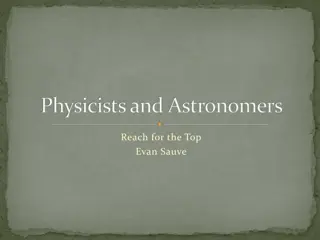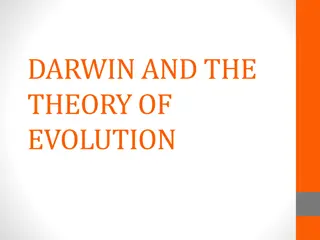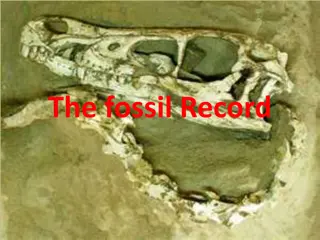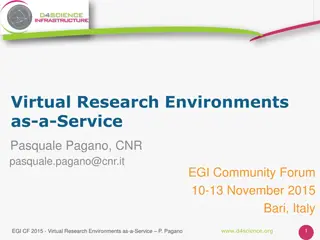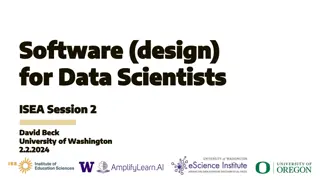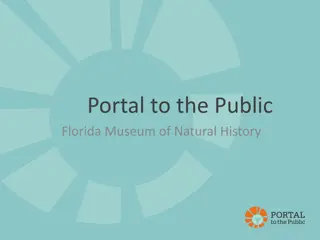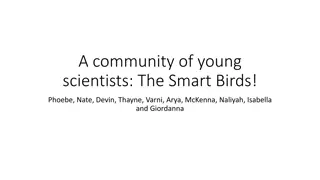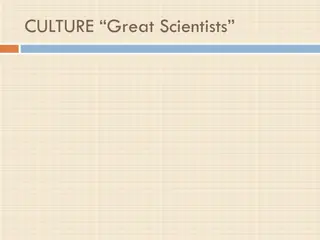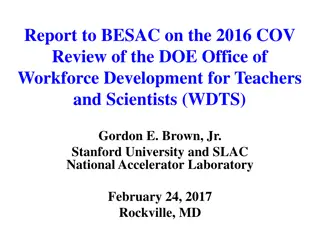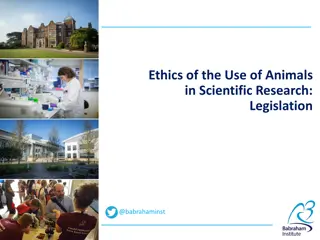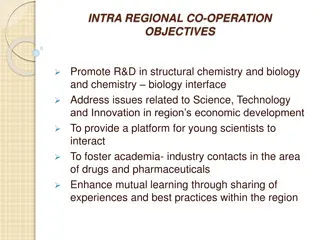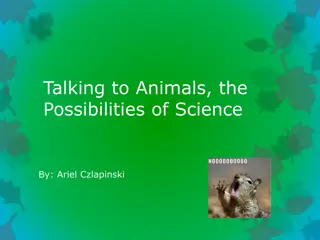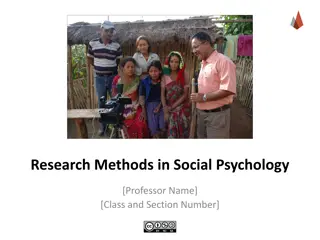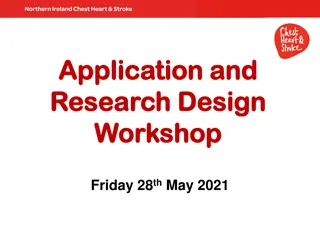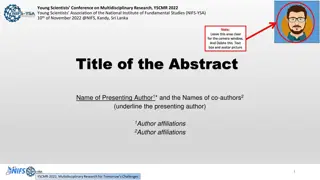Elementary Scientists and Inventors Escape Room
Explore the world of scientists and inventors through an engaging escape room activity. Dive into the lives of individuals like Elizabeth Blackwell, Ada Lovelace, and Isaac Newton by completing interactive tasks that challenge your knowledge and problem-solving skills. Uncover codes, match inventors
0 views • 24 slides
Understanding Algorithm Analysis and Scalability in Computer Science
Scientists and computer scientists often encounter scale differences, and scalability is crucial for accommodating growing inputs. Algorithm analysis, data structures, running times, and experimental studies are key aspects explored in the context of algorithms. Choosing the right type of plot for l
4 views • 17 slides
UCC Research Support and Strategies Overview
UCC's Research Support, Policy & Strategy function, led by David O'Connell, PhD, provides comprehensive support for research activities at the university. The office manages research funding, monitors performance, and facilitates engagement with external stakeholders. UCC's involvement in Horizon Eu
3 views • 17 slides
Insights into Healthcare Science Careers and Specializations
Explore the diverse field of healthcare science through roles like biomedical scientists, clinical scientists, and support workers. Learn about the wide-ranging duties and specializations within the healthcare science sector, including laboratory research, equipment development, and patient care. Di
0 views • 17 slides
National Institute on Aging (NIA) Research Overview and Priorities
NIA conducts diverse research on aging processes, diseases, and conditions, aiming to improve the health and well-being of older adults. The institute focuses on genetic, biological, clinical, behavioral, and social aspects of aging, with priorities in aging physiology, cell biology, behavioral proc
0 views • 15 slides
Understanding Social Science Research for Non-Social Scientists at University of Bath
This resource delves into social science research fundamentals, encompassing types of inquiry, empirical research categories, primary and secondary research distinctions, and the importance of selecting a suitable research topic. It offers guidance on initiating research based on empirical observati
1 views • 10 slides
Enhancing Critical Thinking Skills in Scientific Research
Critical thinking plays a pivotal role in scientific endeavors, enabling researchers to observe, hypothesize, experiment, and draw valid conclusions. Being a natural skeptic is crucial for scientists to scrutinize research papers effectively. By carefully analyzing prior findings, research technique
2 views • 20 slides
Overview of Research Problem Identification and Formulation
Understanding the importance of defining a research problem, this content delves into the selection and formulation of research problems, the definition of a research problem, reasons for defining it, methods for identifying research problems, sources of research problems, and considerations in sele
1 views • 11 slides
Human Frontier Science Program - Advancing Life Sciences Research
The Human Frontier Science Program (HFSP) is an international collaboration established in 1989 to promote and fund basic research in life sciences. With an annual budget of around USD 57M, HFSP focuses on innovative research to extend the frontiers of understanding complex mechanisms in living orga
0 views • 30 slides
Enhancing Translational Research: Bridging the Gap Between Clinical and Basic Scientists
Translational research aims to translate basic scientific discoveries into practical applications for patient care. This involves moving research from the laboratory to clinical settings effectively and safely. Key aspects include designing studies using relevant models, documenting mechanisms of ac
0 views • 8 slides
International PhD Fellowship Opportunities in India and Abroad
Explore various prestigious fellowship opportunities for PhD students in India and abroad, including DAAD Scholarship, Shastri Research Student Fellowship, Newton Bhabha PhD Placement Programme, IUSSTF Graduate Research Opportunities, ASEM-DUO Fellowship Programme, and RamanCharpak Fellowship. These
3 views • 11 slides
Contributions of Greek Scientists to Modern Society
Greeks have made significant contributions to modern society through their inventions and discoveries. Without their innovations, concepts like democracy, philosophy, cartography, and navigation would be unknown. Greek scientists like Thales of Miletus, Aristotle, and Pythagoras laid the foundation
0 views • 14 slides
KORUS-AQ Timeline of Significant Events and Future Milestones
NCAR scientists explore the possibility of an aircraft experiment in Korea leading to the formation of KORUS-AQ. Collaborative efforts, meetings, and preparations are made over several years, culminating in the finalization of the International Agreement and deployment plans. The timeline showcases
0 views • 14 slides
Icelandic Research Fund 2015: Enhancing Scientific Research and Education
The Icelandic Research Fund (IRF) aims to enhance scientific research and education in Iceland by awarding funding to research projects led by individuals, teams, universities, research institutes, and companies. Principal investigators must have completed graduate studies and experience in running
0 views • 22 slides
Understanding Software Design Principles for Data Scientists
Explore the importance of clear design in software development for data scientists, learning from past failures like the Therac-25 incident. Dive into creating understandable designs, user stories, and the significance of simplicity and careful feature selection. Follow a practical example in design
0 views • 88 slides
Advancing Science in Public Policy: The Role of the Union of Concerned Scientists
The Center for Science and Democracy at the Union of Concerned Scientists, led by Director Andrew A. Rosenberg, aims to promote the role of science in public policy by leveraging UCS capabilities and engaging citizens, media, and policymakers. Strengthening the voice for science through the UCS Scie
0 views • 5 slides
Young Scientists Investigate Wildlife Behavior and Habitat Effects
The Wildlife Trackers, a group of young scientists, conducted a study to understand how the presence of people and different habitats affect the behavior and flight responses of animals in their neighborhood. By measuring flight response distances of various animals like birds, lizards, and rabbits,
0 views • 11 slides
Oyster Restoration Efforts in Chesapeake Bay
Efforts are underway to restore oyster populations in Chesapeake Bay tributaries by 2025. Various workgroups, stakeholders, and scientists are collaborating to define restoration goals, develop tributary plans, conduct population surveys, and manage the restoration process. The Harris Creek tributar
0 views • 17 slides
Characteristics of Great Scientists: Insights from Richard W. Hamming's Talk
Explore the essential characteristics of great scientists as outlined by Richard W. Hamming. Delve into the role of luck, courage, age, and working conditions in shaping scientific success. Gain valuable perspectives on the mindset and approach necessary for making impactful contributions in the fie
0 views • 37 slides
Discover Faculty Opinions: A Platform for Scientific Insights
Faculty Opinions, powered by F1000 Prime, is a platform where over 8,000 leading life scientists nominate and review important research articles. With personalized alerts and expert commentary, scientists can stay updated on groundbreaking discoveries without sifting through vast amounts of literatu
0 views • 25 slides
Celebrating Efforts of Scientists, Statisticians, and Journalists: Promoting Access to Best Science and Engaging the Experts
There is much to appreciate in the collaborative efforts of scientists, statisticians, and journalists in ensuring accurate and relevant information reaches the public. With the rising politicization of science, it is crucial to maintain access to the best scientific knowledge for journalists and en
0 views • 8 slides
Introduction to Physics I for Biologists, Geoscientists, & Pharmaceutical Scientists
Delve into the fundamental concepts of physics tailored for biologists, geoscientists, and pharmaceutical scientists. Explore key principles and applications in a concise and engaging manner, enhancing your understanding of the physical world around us.
0 views • 4 slides
Physics Course for Biologists, Geoscientists, and Pharmaceutical Scientists
This physics course tailored for biologists, geoscientists, and pharmaceutical scientists covers lectures, exercises, and exams in both English and German. The course includes weekly exercise sessions, recommended literature, exam details, and study materials available on the course website. Student
0 views • 15 slides
Influential Scientists in History: Newton, Hawking, Einstein, and Kepler
Explore the remarkable contributions of influential scientists from different eras - Sir Isaac Newton, Stephen Hawking, Albert Einstein, and Johannes Kepler. Learn about Newton's laws of motion, Einstein's theory of relativity, Hawking's work on black holes, and Kepler's laws of planetary motion.
0 views • 10 slides
Darwin and the Theory of Evolution: A Comprehensive Overview
Darwin's Theory of Evolution encompasses the concepts of organisms changing over time and life evolving through natural selection. Influenced by scientists such as James Hutton, Jean Baptiste Lamarck, and Alfred Russel Wallace, Darwin's theory culminates in the idea of evolution by natural selection
0 views • 9 slides
Understanding Fossils: Formation, Types, and Significance
Explore the world of fossils and learn about their formation process, different types such as mold, cast, and petrified fossils, and the valuable insights they provide to scientists. Discover how fossils capture the remains of ancient plants and animals, revealing clues about the past through their
0 views • 25 slides
Virtual Research Environments as-a-Service: Advancing Collaborative Research Efforts
Explore how Virtual Research Environments as-a-Service, exemplified by D4Science, enhance research collaboration by providing operational ecosystems, genealogy testbeds, and e-Infrastructures. These environments cater to diverse user needs, from data management to cost reduction, offering capabiliti
0 views • 27 slides
Dermatology Clinical Research in Scotland: Challenges and Opportunities
Clinical research in dermatology in Scotland faces challenges and opportunities, led by experts like Dr. Richard Weller and Prof. David Crossman. The Chief Scientists Office (CSO) plays a key role in supporting high-quality health research in Scotland, fostering partnerships with NHS Research Scotla
0 views • 21 slides
Contribution of HALA Network to ATM Community and SESAR 2020: Achievements and Future Directions
HALA network has been instrumental in fostering research and innovation in the field of automation for ATM systems, providing a platform for knowledge dissemination, collaboration, and advancement. The network has facilitated exploratory research, encouraged young scientists' participation, and crea
0 views • 12 slides
Understanding the Importance of Software Design for Data Scientists
Today's ISEA Session 2 with David Beck from the University of Washington delves into the critical role of intentional software design for data scientists. The session covers the software design approach, user-centric design stories, use cases, components, testing strategies, and the benefits and dra
0 views • 76 slides
Exploring the Portal to the Public at the Florida Museum of Natural History
The Portal to the Public program at the Florida Museum of Natural History aims to bridge the gap between scientists and the public through interactive sessions. The program focuses on informal science education, STEM learning, and science communication workshops for scientists. Funded by the Nationa
0 views • 15 slides
Insights from Young Scientists on How Temperature Affects Bird Behavior
A group of young scientists known as the Smart Birds conducted a study on how temperature influences bird behavior. Through observations recorded in the morning and late afternoon, they found that birds were most active when the temperature ranged between 71-90 degrees Fahrenheit. The study revealed
0 views • 14 slides
Great Scientists Who Shaped Our World
Discover the remarkable contributions of renowned scientists like Galileo, Louis Pasteur, Karl Landsteiner, Francis Crick, James Watson, and Jane Goodall. From revolutionizing astronomy to groundbreaking discoveries in microbiology and genetics, these brilliant minds have left a lasting impact on me
0 views • 8 slides
Review of DOE Office of Workforce Development for Scientists
Assessment of the 2016 review of the Department of Energy's Office of Workforce Development for Teachers and Scientists (WDTS) including its mission, programs reviewed, charges, and additional considerations to enhance workforce development in STEM fields.
0 views • 25 slides
Regulations and Ethics of Animal Use in Scientific Research
The use of animals in scientific research is well-regulated in the UK under the Animals (Scientific Procedures) Act 1986. This legislation aligns with the European Directive 2010/63/EU to protect animals used for scientific purposes. The Home Office issues licences to institutions and project scient
0 views • 15 slides
Strategies for Enhancing Scientific Collaboration in South Asia
This content highlights the objectives of intra-regional co-operation to promote R&D in structural chemistry and biology, address science, technology, and innovation issues, create platforms for young scientists, foster academia-industry contacts in pharmaceuticals, and share best practices within t
0 views • 4 slides
Could Humans Really Talk to Animals? Exploring the Potential Through Science
Discover the fascinating world of communication between humans and animals as scientists delve into the possibility of translating thoughts and ideas across species boundaries. From Nim Chimpsky to Alex the African grey parrot, examples show how intelligent creatures can learn to communicate through
0 views • 5 slides
Understanding Research Methods in Social Psychology
Delve into the world of social psychology research methods with a focus on observation, ethical principles, approaches to studying social phenomena, and the advantages and disadvantages of each approach. Explore the thought process of scientists, research issues, measurement, ethics, WEIRD samples,
0 views • 15 slides
Exploring Research Design and Funding Priorities in Northern Ireland
Dive into the world of research at the upcoming Application and Research Design Workshop scheduled for Friday, 28th May 2021. Discover the strategic priorities driving impactful research initiatives, learn about current research projects, funding processes, and collaborations. Explore the rich histo
0 views • 37 slides
Young Scientists Conference on Multidisciplinary Research 2022
The Young Scientists Conference on Multidisciplinary Research 2022, organized by the Young Scientists Association of the National Institute of Fundamental Studies, is set to take place on the 10th of November 2022 at NIFS in Kandy, Sri Lanka. The conference will focus on addressing tomorrow's challe
0 views • 4 slides



